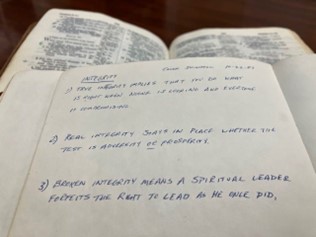Note from Randy: If you have a ministry of any sort—public or private—as a teacher, preacher, leader, helper, or as any kind of salt and light in the world (Matthew 5:13-16)—then take heed: you are a targeted man, a marked woman. I wish I was aware of only a fraction of the stories I know of Christians (and specifically pastors) who have fallen into sin and immorality.
One woman said to me, “There’s so much immorality among Christians now that I’m living in constant fear. It makes it difficult even to work with my associates in the ministry. It’s happened to those more godly than I, so I keep thinking that it’s probably going to happen to me. It almost seems inevitable.”
But as I write in my booklet Sexual Temptation, while God does not want us to be presumptuous, neither does He want us to be paranoid. We do not have to live each day teetering on the edge of immorality or paralyzed by the fear of a sudden fall. In the specific context of seeking to be sexually pure and resisting sexual temptation, the wise man says this to his son:
My son, preserve sound judgment and discernment,
do not let them out of your sight;
they will be life for you,
an ornament to grace your neck.
Then you will go on your way in safety,
and your foot will not stumble;
when you lie down you will not be afraid;
when you lie down, your sleep will be sweet.
Have no fear of sudden disaster
or of the ruin that overtakes the wicked,
for the LORD will be your confidence
And will keep your foot from being snared.(Prov. 3:21-26)
If we walk daily with Christ—fleeing sexual immorality, reminding ourselves of sin’s consequences, being alert to what’s happening in our minds, implementing steps of righteousness and wisdom, and calling upon Christ to empower us—then we can go our way “in safety” and “not be afraid.”
In this article, Pastor Steve Bateman shares advice to help pastors finish serving Jesus well. It’s applicable to all believers, whether they have a public ministry or not.
Let Me Get Home Before Dark: Wisdom to Help Pastors Finish Well
By Steve Bateman
Another high-profile pastor resigns in disgrace. For love of power or a fleeting season of forbidden pleasure, he forfeits his hard-earned reputation, his position of authority, and perhaps even his marriage. But the greatest tragedy is that he stains Christ’s reputation on earth, giving skeptics what they think is good reason to continue their rebellion against the King of kings.
When I was in college in the early 1980s, the renowned and plainspoken preacher Vance Havner delivered his sermon titled “Home Before Dark” in our college chapel. By this time, Havner was an octogenarian widower, and it was probably one of his last times preaching the famous sermon. One statement he made that day has profoundly influenced me: “I’ve stood at the fresh grave of many a preacher who should have died 10 years earlier.”
Later, in 1987, after four years of youth ministry, I entered Dallas Theological Seminary. Those were the days of the televangelist scandals: Jim Bakker’s sexual affair and financial infidelity were broadcast to the world in 1987, and Jimmy Swaggart’s hiring of a prostitute was exposed in 1988. These scandals fed the stereotype of corrupt clergymen fleecing the flock. Everyone who wanted an excuse to renounce Christ and belittle his Bride celebrated these scandals.

In seminary chapels at that time, Chuck Swindoll occasionally returned to his alma mater and sternly warned us, reminding the young men preparing for ministry that we’re entrusted with a sacred duty, a charge to keep and a King to please. We mustn’t betray Christ or besmirch his name.
The day I heard Havner’s sermon, I began to pray God would take me home before I brought disgrace on the gospel. Looking back on how God used those warnings in my life, I sense a responsibility to share with a new generation some practical wisdom on finishing well. Here are five warnings and encouragements.
1. Hold yourself (and others) to high standards.
There’s no perfect pastor, but all pastors must be above reproach. After all, ministry is where you make Christ’s name great, not yours. On October 22, 1987, Swindoll’s chapel message was on David’s great sin. I still have the Bible in which I wrote down his outline (pictured). He spoke on faithfulness and integrity, on doing what’s right when no one is looking.
We must guard our integrity because pastoral ministry isn’t a place to become mature; it’s for the mature man who knows what’s expected, even if he still has much to learn. Pastors are called by God, affirmed by the church, trained in seminary, and responsible for weekly preaching God’s Word. They should know ministry’s rigors and dangers, and they must proactively guard themselves against the temptation to abuse authority for personal gain and selfish pleasure. Thank God, these things are forgivable, but they’re still inexcusable.
2. Consider what you’ll lose.
Genuine repentance can restore a fallen man to fellowship but not necessarily to leadership. God’s grace extends to fallen, brokenhearted pastors, but the hard consequences remain.
I now possess a sad collection of books and commentaries written by once-qualified pastors. They were exceptional communicators and excellent scholars with abilities far beyond mine. But no man is irreplaceable. Thousands of hours and dollars were invested in their training, and each possessed a remarkable skill set, but they’re no longer in the ministry. Some who fall lose relationships with their spouses and other Christians. For all, their days of leading the church are done. Have you considered what you could lose?
3. Be honest about the sin you’re capable of.
I temper my ire at the latest pastoral treason in the news by remembering I’m capable of all manner of sin. Better men than I have made stupid choices, so I need much grace, and I must never drop my guard.
Years ago, I witnessed a friend’s public ordination exam. Among his examiners were heavily degreed pastor-scholars, so he prepared for difficult questions about election and the hypostatic union. But the hardest question was this: “Is there any sin you think you’d never commit?” It’s a question I’ve pondered ever since. The seasoned pastor reminded us all that day of Paul’s warning in 1 Corinthians 10:12–13. It begins, “If you think you are standing firm, be careful that you don’t fall!” (NIV). One of the most useful traits we can develop as pastors is a healthy self-distrust when it comes to sin and temptation.
4. Embrace your obscurity.
Uzziah’s “fame spread far, for he was marvelously helped, till he was strong. But when he was strong, he grew proud, to his destruction” (2 Chron. 26:15–16). Young pastors may dream of fame but have no idea of its costs. Few men experience great success without being assaulted by temptations. Thank God for the Calvins, Spurgeons, and Sprouls, but if you never lead a megachurch, speak at a conference, write a book, or appear on a podcast, you’ll be safer than you know.
If you preach solid sermons to the same people every week, visit them in the hospital, and officiate their weddings and funerals, your church may eventually take you for granted. The praise of strangers may be infrequent, but you’ll be close to family and elders who watch over your soul and dare to ask hard questions. If that’s your situation, embrace it.
5. Expect to finish well.
The internet amplifies every church scandal. Wolves may make the headlines, but thousands of faithful pastors do the Lord’s work without recognition. If you assume most pastors finish poorly, you’d be wrong. As I look back on all my pastors and professors these last six decades, I see faithful men you’ve never heard of who got home before dark and left a quiet legacy of faithful service. It’s not right for their success to be overshadowed by the failures of a few, but this will be righted in heaven.
Failure isn’t inevitable. By God’s grace, you can use common-sense safeguards to help you finish well as you constantly revisit Paul’s exhortation to “be steadfast, immovable, always abounding in the work of the Lord, knowing that in the Lord your labor is not in vain” (1 Cor. 15:58).
Keep the End in View
Every pastor will preach a last sermon. It probably won’t be a masterpiece, but it should be faithful to the text and delivered with a good conscience.
None of us knows how long we have between our last sermon and our last breath, but keeping our funeral in view can help us make better decisions.
Havner’s sermon 40 years ago greatly influenced my college’s president, J. Robertson McQuilkin, who finished well in 2016. Before he died, he left us with a poignant prayer read at Havner’s funeral. Though he was in the sundown of his life, McQuilkin didn’t fear the “dark spectre” of death, and he put into words the cry of my heart: “But I do fear . . . that I should stain your honor, shame your name, grieve your loving heart. . . . Of your grace, Father, I humbly ask . . . Let me get home before dark.”
This article originally appeared on The Gospel Coalition, and is used with the author’s permission.







